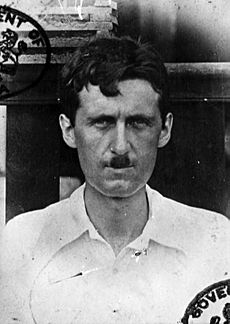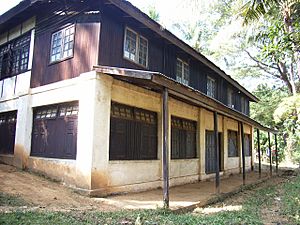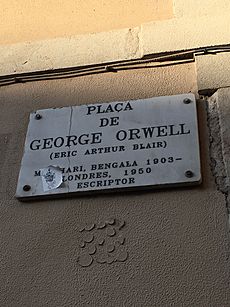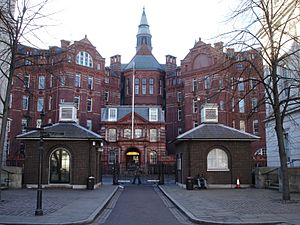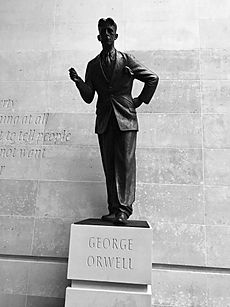George Orwell facts for kids
Quick facts for kids
George Orwell
|
|
|---|---|
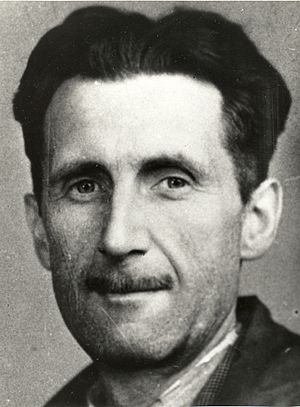
Press card portrait, 1943
|
|
| Born |
Eric Arthur Blair
25 June 1903 Motihari, Bengal, British India
|
| Died | 21 January 1950 (aged 46) London, England
|
| Resting place | All Saints' Church, Sutton Courtenay, Oxfordshire, England |
| Education | Eton College |
| Occupation |
|
| Political party | Independent Labour (from 1938) |
| Spouse(s) |
|
| Children | Richard Blair |
| Writing career | |
| Pen name | George Orwell |
| Language | English |
| Genre |
|
| Subjects |
|
| Years active | 1928–1950 |
| Notable works |
|
| Signature | |
 |
|
Eric Arthur Blair (born June 25, 1903 – died January 21, 1950) was a famous English writer. He is much better known by his pen name, George Orwell. He wrote novels, essays, and worked as a journalist and critic.
Orwell was born in India but grew up and went to school in England from when he was just one year old. After finishing school, he worked as a policeman in Burma, which was then part of the British Empire. Later, he returned to England and started his writing career as George Orwell. He chose this name because he loved the River Orwell in England.
He earned money by writing articles for newspapers and magazines. He also worked as a teacher and a bookseller. In the late 1920s and early 1930s, he became more successful, and his first books were published. He was hurt while fighting in the Spanish Civil War, which affected his health. During World War II, he worked as a journalist and for the BBC.
In 1945, his book Animal Farm made him very famous. In his last years, he wrote Nineteen Eighty-Four. This book was published in June 1949, less than a year before he passed away.
Orwell's writings are still very important today. Many words and phrases he used, like "Big Brother", "Thought Police", "Newspeak", and "thoughtcrime", are now part of the English language. In 2008, The Times newspaper said George Orwell was the second greatest British writer since 1945.
Contents
Early Life and Education
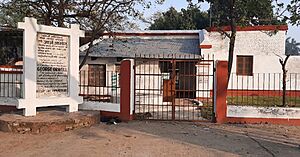
Eric Blair was born on June 25, 1903, in India. When he was one year old, he moved to England, where he grew up and went to school. His father, Richard Walmesley Blair, worked for the British government in India. His mother, Ida Mabel Blair, grew up in Burma. Eric had two sisters: Marjorie, who was five years older, and Avril, who was five years younger.
Eric spent most of his early childhood with his mother and sisters. He didn't see his father much until 1912. When he was five, Eric went to a convent school in Henley-on-Thames. His mother wanted him to go to a good private school, but his family couldn't easily afford it.
Thanks to his uncle's connections, Blair received a scholarship to St Cyprian's School in Eastbourne. He started there in September 1911 and stayed for five years, only going home for holidays. Even though he didn't know about the reduced fees, he soon realized his family was poorer than others. Blair disliked this school and later wrote an essay called "Such, Such Were the Joys" about his time there.
While at St Cyprian's, Blair had two poems published in a local newspaper. He also won scholarships to Wellington and Eton, two very famous schools. In May 1917, he got a place at Eton. He stayed at Eton until December 1921.
Blair's school reports showed he didn't always focus on his studies. However, he helped create a college magazine and joined other publications. His parents couldn't afford to send him to university without another scholarship, and his grades weren't good enough to win one. His family decided he should join the Imperial Police in India. To do this, he had to pass an exam. He passed, coming seventh out of 26 candidates.
Policing in Burma
Blair chose to be posted in Burma because his grandmother lived there. In October 1922, he sailed to Burma to join the Indian Imperial Police. He became an Assistant District Superintendent.
In Burma, Blair was seen as a bit of an outsider. He spent a lot of time alone, reading or doing things that were not typical for British officers, like visiting churches of the local Karen group. A colleague remembered that Blair quickly learned the local language and could speak fluently with Burmese priests. While in Burma, Blair grew a pencil moustache, which he kept for the rest of his life.
In late 1926, he was sent to Katha, where he got dengue fever in 1927. He was allowed to return to England in July because of his illness. While on leave in England, he decided not to go back to Burma. He resigned from the police in March 1928, after five and a half years of service, to become a writer. His experiences in the Burma police inspired his novel Burmese Days (1934) and essays like "A Hanging" (1931) and "Shooting an Elephant" (1936).
Teaching Career
In April 1932, Blair became a teacher at The Hawthorns High School, a small boys' school in Hayes, West London. It had only about 14 to 16 boys aged 10 to 16.
In mid-1933, Blair left Hawthorns to teach at Frays College in Uxbridge. This was a much bigger school with 200 students. He bought a motorcycle and enjoyed riding through the countryside. On one trip, he got very wet and caught a chill that turned into pneumonia. He was taken to a hospital, where he was very ill. When he was released in January 1934, he went home to get better and never returned to teaching.
Spanish Civil War
Orwell traveled to Spain on December 23, 1936, to fight in the Spanish Civil War. He joined the anti-fascist (anti-dictator) troops. He was sent to the Aragon Front, which was a quiet area. By January 1937, it was deep winter, and Orwell was surprised by the lack of weapons, food, and firewood. Because of his police training, Orwell quickly became a corporal.
In 1937, a sniper's bullet hit him in the throat. The bullet just missed a main artery, but his voice became very quiet. The wound was so clean that it healed quickly. He received treatment and was declared unable to serve in the war anymore.
In early July 1937, Orwell returned home. His experiences in the Spanish Civil War led to his book Homage to Catalonia (1938).
Literary Career and Legacy
For most of his career, Orwell was known for his journalism. He wrote many essays, reviews, and columns for newspapers and magazines. He also wrote books based on his reporting, like Down and Out in Paris and London (about being poor in these cities) and The Road to Wigan Pier (about the tough living conditions of poor people in northern England).
Today, many people know Orwell best for his novels, especially Animal Farm and Nineteen Eighty-Four. Animal Farm is often seen as a story about how the Soviet Union changed after the Russian Revolution and how Stalinism rose to power. Nineteen Eighty-Four describes life under a totalitarian government, where the state controls everything.
Nineteen Eighty-Four is often compared to Brave New World by Aldous Huxley. Both are powerful dystopian novels. A dystopian story shows a future world where things have gone terribly wrong, often with a government that controls people completely. In 1984, Nineteen Eighty-Four and Ray Bradbury's Fahrenheit 451 won the Prometheus Award for their contributions to dystopian literature. In 2011, Animal Farm also won this award.
In 2003, Nineteen Eighty-Four was ranked number 8 and Animal Farm number 46 in a BBC poll called The Big Read. In 2021, readers of the New York Times Book Review voted Nineteen Eighty-Four as the third best book of the past 125 years.
Coming Up for Air, his last novel before World War II, is a very "English" story. It mixes worries about war with peaceful memories of an Edwardian childhood by the River Thames. The novel is quite sad, suggesting that industry and capitalism had ruined the best parts of Old England, and that new threats were appearing.
Orwell as a Literary Critic
Throughout his life, Orwell earned money by reviewing books. His reviews are well-known and have influenced how people think about literature.
Final Months and Death
Orwell's health got worse after he was diagnosed with tuberculosis in December 1947. He passed away early on the morning of January 21, 1950, at the age of 46.
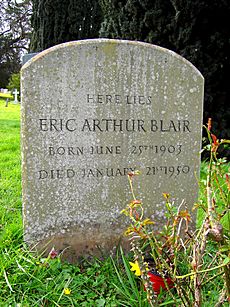
Orwell had asked to be buried in the churchyard closest to where he died. Since there was no space in central London graveyards, his wife asked friends for help. David Astor, a friend, lived in Sutton Courtenay, and arranged for Orwell to be buried in the churchyard of All Saints' there. Orwell's gravestone says: "Here lies Eric Arthur Blair, born June 25th 1903, died January 21st 1950." It does not mention his famous pen name, George Orwell.
Personal Life
Orwell married Eileen O'Shaughnessy on June 9, 1936. Many people said they had a happy marriage.
In June 1944, Orwell and Eileen adopted a three-week-old boy named Richard Horatio. Richard later said that Orwell was a wonderful father who cared for him a lot and gave him much freedom. After Orwell's death, Richard went to live with Orwell's sister and her husband.
Orwell was very lonely after Eileen died in 1945. He wanted to find a new wife, both for himself and as a mother for Richard. He proposed to several women, and eventually Sonia Brownell accepted. They married on October 13, 1949, just three months before Orwell died. Some people believe Sonia was the inspiration for the character Julia in Nineteen Eighty-Four.
Influence on Language and Writing
In his essay "Politics and the English Language" (1946), Orwell wrote about how important it is to use clear and exact language. He believed that unclear writing could be used to control people's thoughts. In that essay, Orwell gave six rules for writers:
- Never use a metaphor, simile or other figure of speech which you are used to seeing in print.
- Never use a long word where a short one will do.
- If it is possible to cut a word out, always cut it out.
- Never use the passive where you can use the active.
- Never use a foreign phrase, a scientific word or a jargon word if you can think of an everyday English equivalent.
- Break any of these rules sooner than say anything outright barbarous.
Orwell worked as a journalist for The Observer newspaper for seven years. Its editor, David Astor, gave a copy of this famous essay to every new journalist.
In Nineteen Eighty-Four, Orwell described a government that controlled people's thoughts by controlling their language. This made it impossible for people to think certain ideas. Several words and phrases from Nineteen Eighty-Four are now commonly used:
- "Newspeak" is a simple, confusing language designed to stop independent thought.
- "Doublethink" means believing two opposite things at the same time.
- The "Thought Police" are those who stop people from having different opinions.
- "Prolefeed" is fake, simple entertainment (like books, movies, and music) used to control people and make them obedient.
- "Big Brother" is a powerful leader who watches everyone.
The word "Orwellian" describes a way of controlling people through propaganda, spying, false information, denying the truth, and changing the past.
Orwell might have been the first person to use the term "cold war". He used it in an essay in 1945 to describe the tense relationship between the Western and Eastern powers after World War II.
Statue
A statue of George Orwell, made by British sculptor Martin Jennings, was revealed on November 7, 2017. It stands outside Broadcasting House, which is the main building for the BBC. On the wall behind the statue, there is a famous quote from Orwell: "If liberty means anything at all, it means the right to tell people what they do not want to hear." These words are from a planned introduction to Animal Farm and are a strong message about the importance of free speech.
Novels
- Burmese Days (1934)
- A Clergyman's Daughter (1935)
- Keep the Aspidistra Flying (1936)
- Coming Up for Air (1939)
- Animal Farm (1945)
- Nineteen Eighty-Four (June 8, 1949)
Books Based on His Life
- Down and Out in Paris and London (1933)
- The Road to Wigan Pier (1937)
- Homage to Catalonia (1938)
Poems
- "Romance"
- "A Little Poem"
- "Awake! Young Men of England"
- "Kitchener"
- "Our Minds are Married, But we are Too Young"
- "The Pagan"
- "The Lesser Evil"
- "Poem From Burma"
Images for kids
-
The blue house on the right was Blair's 1927 lodgings in Portobello Road, London
-
Southwold Pier in Southwold. Orwell wrote A Clergyman's Daughter (1935) in the town, basing the fictional town of Knype Hill partly on Southwold.
-
The pen name George Orwell was inspired by the River Orwell in the English county of Suffolk.
-
English Heritage blue plaque in Kentish Town, London where Orwell lived from August 1935 until January 1936.
-
A former warehouse at Wigan Pier is named after Orwell.
-
Laurence O'Shaughnessy's former home, the large house on the corner, 24 Crooms Hill, Greenwich, London
-
Orwell spoke on many BBC and other broadcasts, but no recordings are known to survive.
-
Barnhill on the Isle of Jura, Scotland. Orwell completed Nineteen Eighty-Four while living in the farmhouse.
-
One of the Animal Farm cartoon strips produced for the Cold War anti-communist department of the British Foreign Office, the IRD
See also
 In Spanish: George Orwell para niños
In Spanish: George Orwell para niños


